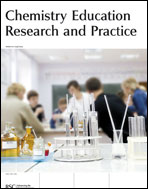Let’s teach how we think instead of what we know
Abstract
Despite multiple calls for reform, the curriculum for first-year college chemistry at many universities across the world is still mostly fact-based and encyclopedic, built upon a collection of isolated topics, oriented too much towards the perceived needs of chemistry majors, focused too much on abstract concepts and algorithmic problem solving, and detached from the practices, ways of thinking, and applications of both chemistry research and chemistry education research in the 21st century. This paper describes an alternative way of conceptualizing the introductory chemistry curriculum for science and engineering majors by shifting the focus from learning chemistry as a body of knowledge to understanding chemistry as a way of thinking. Starting in 2007, we have worked on the development and implementation of a new curriculum intended to: promote deeper conceptual understanding of a minimum core of fundamental ideas instead of superficial coverage of multiple topics; connect core ideas between the course units by following well-defined learning progressions; introduce students to modern ways of thinking and problem-solving in chemistry; and involve students in realistic decision-making and problem-solving activities.
- This article is part of the themed collection: Evidentially-Based Curriculum Development

 Please wait while we load your content...
Please wait while we load your content...